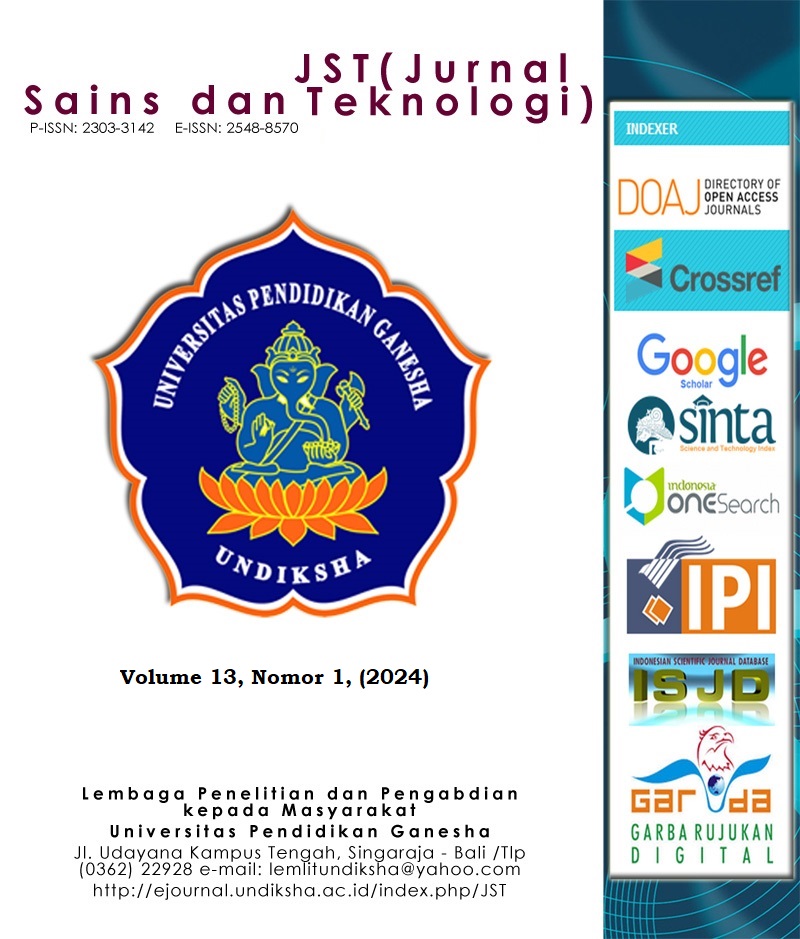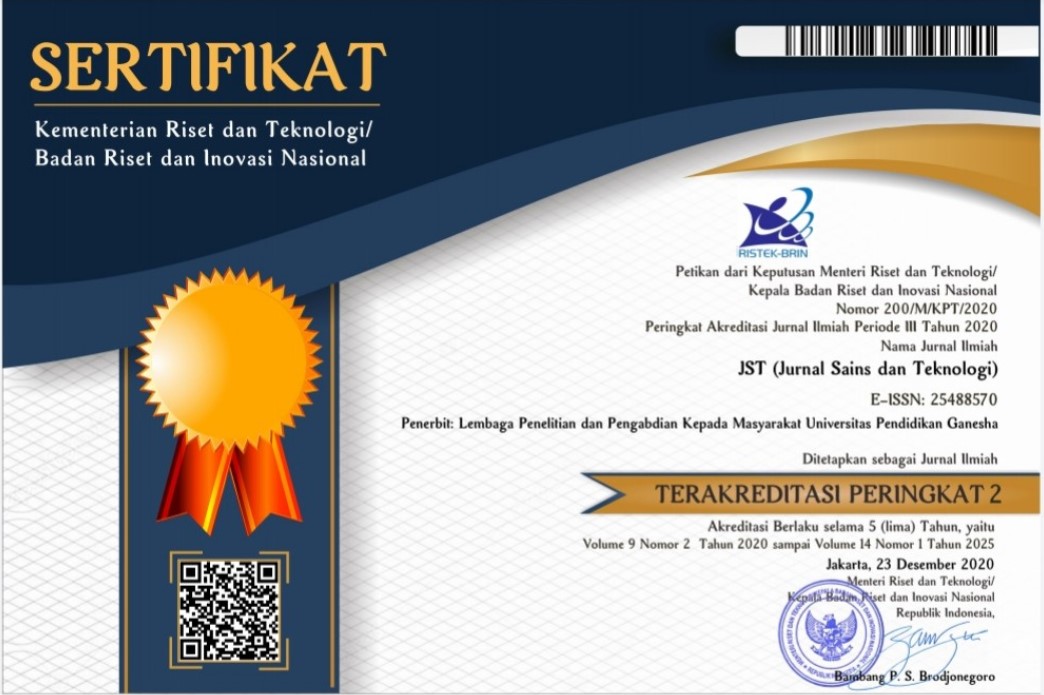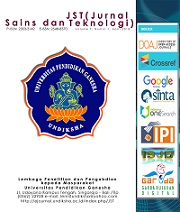Enhancing Student Achievement Through Tailored Mathematics Instruction
DOI:
https://doi.org/10.23887/jstundiksha.v13i1.82977Keywords:
Development, Differentiated Learning, MathematicsAbstract
The transition from online learning to limited face-to-face learning requires innovation in learning to increase students' motivation and learning outcomes. This study aims to develop differentiated mathematics learning to improve student learning outcomes and determine the quality of differentiated mathematics learning. This study is a development study using the ADDIE model. The data analysis technique used in this study is for the analysis stage using diagnostic assessment, while at the implementation stage using product validity data analysis by calculating the average score, data analysis to measure product practicality by calculating the average score and data analysis to measure the effectiveness of learning. The results showed that tailored mathematics instruction significantly improved students' conceptual understanding and problem-solving skills compared to traditional instruction methods. Students who received tailored instruction tended to be more active participants in learning, had higher motivation, and showed significant improvements in final test results. This suggests that a tailored instruction approach can be an effective strategy in accommodating the diversity of student abilities, helping achieve more optimal learning outcomes. The implications of this study provide a basis for education policy to further support teacher training in the application of differentiation in instruction, especially in subjects considered difficult, such as mathematics.
References
Amalia, L., Ni, I., Kumalasari, E., Fajri Ma, P., & Ika Nurhidayah, R. (2023). 11 Implimentasi Project Based Learning (Leny Amalia. Dkk.) Madani: Jurnal Ilmiah Multidisiplin, 1(11), 237–244. Https://Doi.Org/10.5281/Zenodo.10252069.
Ananda, R. (2018). Penerapan Pendekatan Realistics Mathematics Education (Rme) Untuk Meningkatkan Hasil Belajar Matematika Siswa Sekolah Dasar. Jurnal Cendekia : Jurnal Pendidikan Matematika, 2(1), 125–133. Https://Doi.Org/10.31004/Cendekia.V2i1.39.
Astuti, A. (2018). Penerapan Realistic Mathematic Education (Rme) Meningkatkan Hasil Belajar Matematika Siswa Kelas Vi Sd. Jurnal Cendekia : Jurnal Pendidikan Matematika, 2(1), 49–61. Https://Doi.Org/10.31004/Cendekia.V2i1.32.
Gaitas, S., & Alves Martins, M. (2020). Teacher Perceived Difficulty In Implementing Differentiated Instructional Strategies In Primary School. International Journal Of Inclusive Education, 21(5), 544–556. Https://Doi.Org/10.1080/13603116.2016.1223180.
Geel, M., Keuning, T., & Safar, I. (2023). How Teachers Develop Skills For Implementing Differentiated Instruction: Helpful And Hindering Factors. Teaching And Teacher Education: Leadership And Professional Development, 1(February), 100007. Https://Doi.Org/10.1016/J.Tatelp.2022.100007.
Gheyssens, E., Coubergs, C., Griful-Freixenet, J., Engels, N., & Struyven, K. (2019). Differentiated Instruction: The Diversity Of Teachers’ Philosophy And Praxis To Adapt Teaching To Students’ Interests, Readiness And Learning Profiles. International Journal Of Inclusive Education, 26(14), 1383–1400. Https://Doi.Org/10.1080/13603116.2020.1812739.
Gusteti, M. U., & Neviyarni, N. (2020). Differentiated Learning In Mathematics Learning In The Independent Curriculum. Lebesgue Journal: Scientific Journal Of Mathematics Education, Mathematics And Statistics, 3(3), 636–646. Https://Doi.Org/10.46306/Lb.V3i3.180.
Joseph, S., Thomas, M., Simonette, G., & Ramsook, L. (2020). The Impact Of Differentiated Instruction In A Teacher Education Setting: Successes And Challenges. International Journal Of Higher Education, 2(3), 28–40. Https://Doi.Org/10.5430/Ijhe.V2n3p28.
Kdise, E., Urath, S., Rangotwat, C. A., & Ratuanik, M. (2021). Wermaktian Kabupaten Kepulauan Tanimbar Yang Berjumlah 17 Siswa. 2(12), 2013–2027.
Konstantinou-Katzi, P., Tsolaki, E., Meletiou-Mavrotheris, M., & Koutselini, M. (2020). Differentiation Of Teaching And Learning Mathematics: An Action Research Study In Tertiary Education. International Journal Of Mathematical Education In Science And Technology, 44(3), 332–349. Https://Doi.Org/10.1080/0020739x.2012.714491.
Kristina, B. T. & E. U. (2016). Peningkatan Hasil Belajar Siswa Menggunakan Media Manipulatif Pada Pembelajaran Matematika Sekolah Dasar. Jurnal Pendidikan Dan Pembelajaran Khatulistiwa, 7 No 9(5), 1–10.
Nuhung, K. H. (2016). Penerapan Pendekatan Matematika Realistik Pada Materi Penjumlahan Pecahan Untuk Meningkatkan Hasil Belajar Siswa Kelas Iv Sekolah Dasar. Jurnal Pendidikan Guru Sekolah Dasar, 1(2), 163–173.
Nurdina Hasanah, Sapna Andani Batubatara, & Dalilah Awanis. (2023). Metode Pembelajaran Kooperatif Menggunakan Media Think Pair Share Untuk Meningkatkan Hasil Belajar Matematika Siswa Kelas V Sd. Jurnal Riset Rumpun Matematika Dan Ilmu Pengetahuan Alam, 2(1), 202–212. Https://Doi.Org/10.55606/Jurrimipa.V2i1.779.
Pasinggi, Y. S., & Thuken, R. (2019). Penerapan Pembelajaran Matematika Realistik Pada Penjumlahan Pecahan Dapat Meningkatkan Hasil Belajar Siswa Kelas V Sdn 28 Kota Parepare. Publikasi Pendidikan, 9(1), 72. Https://Doi.Org/10.26858/Publikan.V9i1.8445.
Peralbo-Uzquiano, M., Fernández-Abella, R., Durán-Bouza, M., Brenlla-Blanco, J.-C., & Cotos-Yáñez, J.-M. (2022). Evaluation Of The Effects Of A Virtual Intervention Programme On Cognitive Flexibility, Inhibitory Control And Basic Math Skills In Childhood Education. Computers & Education, 159(5), 104006.
Rahman, A. A., & Nasryah, C. E. (2020). Efektivitas Model Pembelajaran Missouri Mathematics Project Untuk Meningkatkan Hasil Belajar Siswa Sma. Mosharafa: Jurnal Pendidikan Matematika, 9(2), 335–346. Https://Doi.Org/10.31980/Mosharafa.V9i2.650.
Rijal, M. R., & Oktaviani, R. (2017). Penerapa Metode Kumon Untuk Meningkatkan Hasil Belajar Matematika Pada Materi Bilangan Romawi. Primary: Jurnal Keilmuan Dan Kependidikan Dasar, 8(1), 75–92.
Ryan, J., & Bowman, J. (2022). Teach Cognitive And Metacognitive Strategies To Support Learning And Independence. High Leverage Practices And Students With Extensive Support Needs, 3(3), 170–184. Https://Doi.Org/10.4324/9781003175735-15.
Safitri, N., Safriana, S., & Fadieny, N. (2023). Literatur Review: Model Pembelajaran Berdiferensiasi Meningkatkan Hasil Belajar Peserta Didik. Jurnal Pendidikan Dan Ilmu Fisika (Jpif), 5(5), 246–255. Https://Journal.Uniga.Ac.Id/Index.Php/Jpif/Article/View/2811%0ahttps://Journal.Uniga.Ac.Id/Index.Php/Jpif/Article/Download/2811/1746.
Selian, F. H., & Rambe, R. N. (2022). Pengaruh Penggunaan Aplikasi Quizizz Dalam Meningkatkan Hasil Belajar Siswa Madrasah Ibtidaiyah Di Masa Pandemi. Edukatif : Jurnal Ilmu Pendidikan, 4(6), 7370–7377. Https://Doi.Org/10.31004/Edukatif.V4i6.4083.
Sholihin, M., Sari, R. C., Yuniarti, N., & Ilyana, S. (2020). A New Way Of Teaching Business Ethics: The Evaluation Of Virtual Reality-Based Learning Media. International Journal Of Management Education, 18(3), 100428. Https://Doi.Org/10.1016/J.Ijme.2020.100428.
Strogilos, V., Avramidis, E., Voulagka, A., & Tragoulia, E. (2021). Differentiated Instruction For Students With Disabilities In Early Childhood Co-Taught Classrooms: Types And Quality Of Modifications. International Journal Of Inclusive Education, 24(4), 443–461. Https://Doi.Org/10.1080/13603116.2018.1466928.
Suprayogi, M. N., & Valcke, M. (2018). Differentiated Instruction In Primary Schools: Implementation And Challenges In Indonesia. Ponte International Scientific Researchs Journal, 72(6), 2–18. Https://Doi.Org/10.21506/J.Ponte.2016.6.1.
Yuen, S. Y., Leung, C. C. Y., & Wan, S. W.-Y. (2023). Teachers’ Perceptions And Practices Of Differentiated Instruction: Cross-Cultural Validation Of The Differentiated Instruction Questionnaire In Hong Kong. International Journal Of Educational Research, 115(3), 102044.
Downloads
Published
How to Cite
Issue
Section
License
Copyright (c) 2024 Putu Ledyari Noviyanti

This work is licensed under a Creative Commons Attribution-ShareAlike 4.0 International License.
Authors who publish with the Jurnal Sains dan Teknologi (JST) agree to the following terms:
- Authors retain copyright and grant the journal the right of first publication with the work simultaneously licensed under a Creative Commons Attribution License (CC BY-SA 4.0) that allows others to share the work with an acknowledgment of the work's authorship and initial publication in this journal.
- Authors are able to enter into separate, additional contractual arrangements for the non-exclusive distribution of the journal's published version of the work (e.g., post it to an institutional repository or publish it in a book), with an acknowledgment of its initial publication in this journal.
- Authors are permitted and encouraged to post their work online (e.g., in institutional repositories or on their website) prior to and during the submission process, as it can lead to productive exchanges, as well as earlier and greater citation of published work. (See The Effect of Open Access)
















